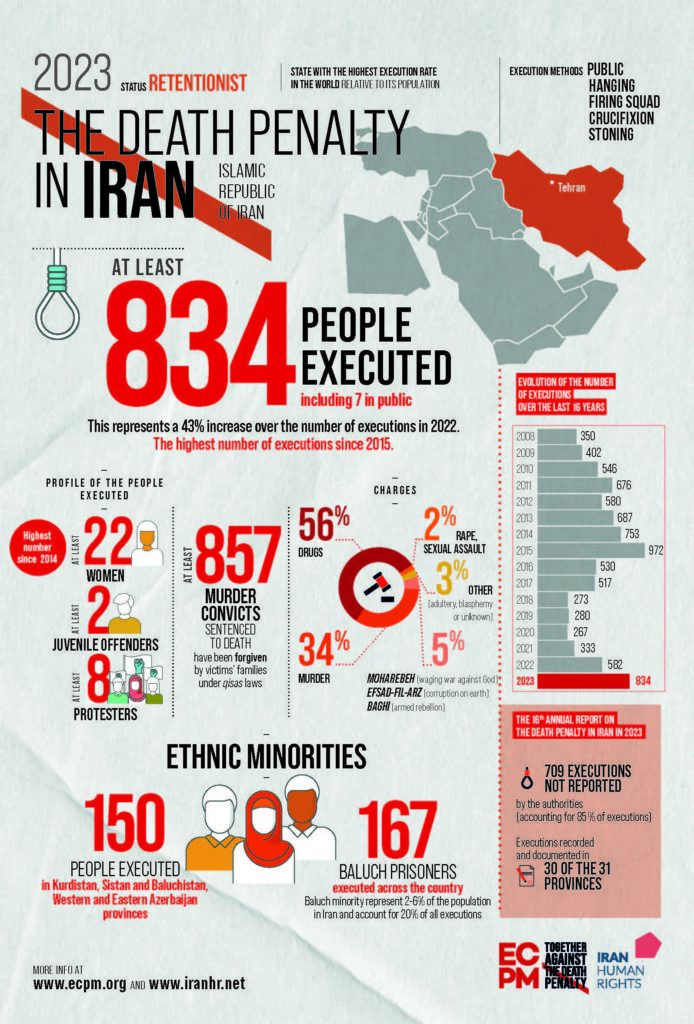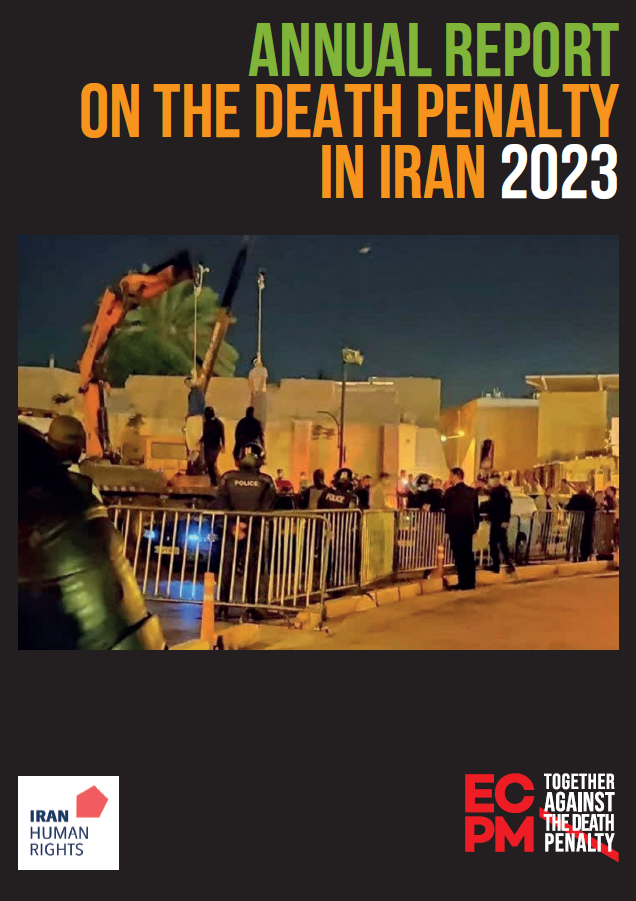

Throughout its 100 pages, the report demonstrates the use of the death penalty as the ultimate tool of political repression. As Mahmood Amiry-Moghaddam, Director of Iran Human Rights, points out: “Instilling fear in society is the only way for the regime to cling to power, and the death penalty is its most important instrument. Increasing the political cost of executions through international pressure can slow down the regime’s killing machine.”
This new publication sheds light on the use of the death penalty in Iran during the year that saw the difficult continuation of the nationwide “Woman, Life, Freedom” protest movement following the state murder of Jina (Mahsa) Amini, the Nobel Peace Prize being awarded to human rights defender, Narges Mohammadi who faces new charges behind bars. In 2023, at least 22 women were executed, the highest number in the last ten years.
It should be noted that the report does not include in its statistics at least 551 people killed during demonstrations or other extrajudicial executions inside and outside prisons. At least 8 protesters were among those executed in 2023, 6 of whom had been arrested in relation to the “Woman, Life, Freedom” demonstrations and sentenced after unfair trials.
Serious violations of international law
In 2023, the Iranian authorities violated their international obligations by executing people for crimes that do not fall into the category of the most serious crimes under international law, carried out public executions and hanged at least two juvenile offenders, one of whom was 17 at the time of execution.
Of particular concern is the dramatic escalation in the number of drug-related executions in 2023. However, the United Nations’ Office for Drugs and Crimes (UNODC) not only has not reacted to the surge, but signed a new cooperation agreement with the Islamic Republic of Iran.
“The abolition of the death penalty for drug-related offences must be a precondition for any future cooperation between the UNODC and Iran in the fight against drug trafficking”
Raphaël Chenuil-Hazan, ECPM Executive Director
People executed for drug offences belong to the most marginalised communities in society, and ethnic minorities, in particular the Baluch, are greatly over-represented among those executed. In 2023, Baluch people accounted for 20% of executions, while only representing between 2% and 6% of the Iran’s population. All drug and security-related charges are under the jurisdiction of the Revolutionary
Courts, which handed down death sentences for 512 (61%) of those executed in 2023.
The public opinion is increasingly resistant to the use of the death penalty
Nevertheless, the death penalty in Iran is increasingly being challenged by the population. This report confirms that this underlying trend has gained momentum since 2020, and has accelerated further. In the majority of cases, when families can choose between forgiveness (no execution) and qisas (execution), they opt for forgiveness. This allows Iranian citizens to express their opposition to the death penalty in a roundabout way, thus escaping possible persecution by the authorities. The abolitionist movement has also strengthened with anti-death penalty protests organised outside prisons and government buildings.
Since 2018, five leading figures, lawyers and human rights activists have written the preface to the Annual Report on the Death Penalty in Iran. As their timeless and essential words are as relevant today as they were when they were written, we share them again in memory of Robert Badinter, the French Minister of Justice who abolished the death penalty in France in 1981 and who sadly passed away on 9 February 2024. In the preface he penned in 2019, he wrote: “Iran and its people, heirs to a long and glorious history, deserve better than this bloody record.”
Iran Human Rights and ECPM call on the international community to place the death penalty at the top of the agenda of any dialogue with representatives of the Islamic Republic, and to play a more active role in supporting the improvement of the human rights situation, in particular by promoting the abolition of the death penalty in Iran. In 2024, the international community must pay close attention to the recommendations that will be made by the Fact-Finding Mission and the UN Special Rapporteur on Human Rights Violations in the Islamic Republic of Iran, as well as in the context of the Universal Periodic Review.
Key figures
- At least 834 people were executed in 2023, an increase of 43% from 582 people executed in 2022. Of those, 7 people were hanged in public spaces.
- 125 executions (15%) were announced by official sources, compared to an average of 12% in 2022 and 33% in 2018-2020.
- 85% of executions in the 2023 report (709 executions) were not announced by the authorities.
- At least 282 people (34% of total executions) were executed for murder.
- At least 471 executions (56% of all executions) were for drug-related charges.
- At least 2 juvenile offenders were executed, one of whom was 17 at the time execution.
- At least 22 women were executed.
- At least 8 protesters were executed for murder and security-related charges of moharebeh (enmity against God) and efsad-fel arz (corruption on earth).
- At least 857 prisoners sentenced to death for murder were forgiven by the families of murder victims per qisas laws.
Press:
Aurélie Bois : aurelie@agencethedesk.com + 33 6 87 26 27 68
Bertin Leblanc : bleblanc@ecpm.org +33 7 70 11 12 43
Kambiz Ghafouri : mail@iranhr.net +358 40 768 7600